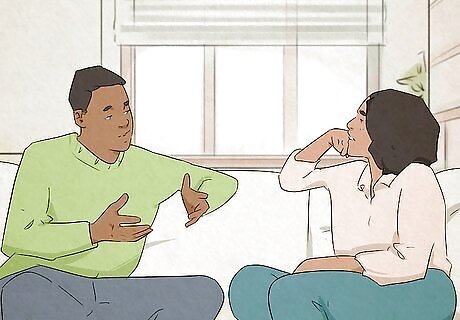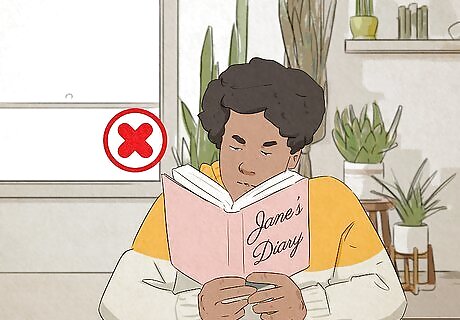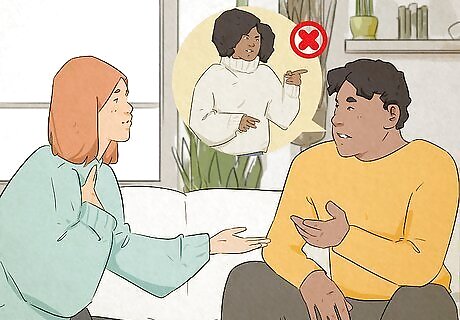
views
Should I tell my girlfriend I’m getting jealous?

Yes, if you two are drifting apart or something abruptly changed. If your relationship is deteriorating and you feel like you and your girlfriend aren’t as close as you used to be, you may start to get jealous. This is a consequence of feeling like your relationship is under threat. If it feels like you’re losing your girlfriend, it’s important to talk about what’s going on. In this case, your jealousy is a symptom of something else, and it’s not the main issue. Your jealousy should go away once the two of you talk about what’s going on with your relationship. This kind of jealousy might be caused by a decline in communication, an increase in conflict, or a sudden drop in signs of affection or physical intimacy.

Yes, if your girlfriend is doing something to trigger the jealousy. If you are not a naturally jealous person but your girlfriend is doing something specific that’s triggering this feeling, it’s important to bring it up and discuss it. If you don’t, you may become resentful, and your girlfriend won’t know what she’s doing wrong, which can lead to even more friction. In this instance, your jealousy is well-founded and it’s fair to address the behavior directly, even if your girlfriend meant no harm by whatever she was doing This doesn’t automatically mean that your girlfriend is doing something wrong (although that may be the case). Try to talk about the behavior without saying she’s doing something bad. This can happen if your girlfriend is spending a ton of time with a friend, or if she doesn’t text you back for days at a time, for example.

No, if your insecurities aren’t persistent. Everybody gets jealous sometimes. It’s a totally natural and normal part of being in a relationship. If this is only an occasional thing and the feelings of jealousy are fleeting, it’s probably best to just work through it in the moment and move on. If you give too much energy to the jealous thoughts, you may accidentally make them worse. If your occasional feelings of jealousy aren’t actively harming your relationship and your girlfriend isn’t doing anything especially nefarious to trigger these feelings, this is probably the ideal option. This kind of jealousy might include questions in your head, like, “What if I’m not good enough?” You may also feel this way if you see your girlfriend smile at another guy or girl, or if she has an attractive friend you don’t know all that well.

No, if you feel like your jealousy is just coming from a place of insecurity. If you’re feeling jealous but your girlfriend isn't doing anything wrong to trigger those feelings, it’s okay to keep how you're feeling to yourself and to work on it independently. A lot of people get jealous over harmless things sometimes, but if you don’t want that jealousy to impact your relationship, it may make sense not to say anything. If your relationship is relatively new, this might be the best option. Expressing feelings of jealousy early on in a relationship can scare your partner off. These insecurities can often come from a lack of self-love and a lack of self-confidence.

Yes, if you want her help working through your jealousy. Knowing you have a problem with jealousy doesn’t automatically mean it will go away. If you want some reassurance and validation, it may be worth discussing it. You may also want to talk to your girlfriend about what you’re feeling if you know the jealousy might impact your behavior and you think telling her about your jealousy might give her the context she needs to understand you. Jealousy isn't always logical, but that doesn’t mean it isn’t real. Talking to your girlfriend can help you work through feelings of jealousy, even if they're coming from a place of insecurity.
How to Talk to Your Girlfriend about Your Jealousy

Do this face-to-face when you’re both calm and happy. If you approach her in a moment of jealousy, you may impulsively say something you don’t mean. Wait until you’re in a good place emotionally, and alone. Casually bring up that you’d like to discuss something that’s been on your mind. You might say, “Hey, can we talk about something? It’s not the end of the world or anything, but something has been bugging me lately.” Do this in person so that you can read her body language and interpret her tone appropriately. It’s too easy to misunderstand one another over the phone or via text.

Tell her that you’re feeling jealous and explain why. Try not to tiptoe around the subject. Just let her know that you’re upset and give her the information she needs to know why you feel this way. Try to avoid using any accusatory language, and keep a calm, friendly tone. You could say: “I’ve noticed you’ve been spending a lot of time around Jason lately, and I’m not accusing you of anything, but it’s been kind of bothering me.” “I know it’s not real, but I’ve been having these jealous feelings recently. I know it’s not your fault or anything, but I just want to let you know.” In a lot of cases, jealousy can stem from a fundamental sense of misunderstanding between partners.

Give her context for what you want out of this convo. Your girlfriend may be taken aback that you’re calling attention to negative feelings, so let her know what you actually want out of this conversation ahead of time. This should give her some room to relax. If she knows where this is going, she won’t be so nervous or on edge. Try something like: “I was hoping we could talk about how we communicate when we’re spending a lot of time away from one another.” “I have had bad experiences in the past and I know it makes me kind of twitchy sometimes. I just want you to understand that I need extra support sometimes.”

Ask your girlfriend for reassurance or help. If your girlfriend is receptive and understanding, she’ll want to problem-solve with you. Let her know what you think you might need to feel like you’re in a better place in the relationship. Use “I” language to articulate what you want so that your girlfriend doesn’t feel like you’re attacking her. You might say: “Is it possible that we can text or check in with one another on nights where we’re hanging out with friends?” “I know it’s not super fair to you, but I’d really appreciate it if I got some reassurance and reminders that we’re in a good place every now and then.”

Respond to her questions if she has any. Depending on how you framed the way you feel, your girlfriend may have follow-up questions for you. Try to answer her in an honest and kind way. If she gets upset, remind her that you care about her and that you aren’t trying to accuse her of anything. She may try to explain herself, or ask why her behavior bothers you so much. She might ask about whether you have a tendency of being jealous in past relationships, or how she can best alleviate the way you feel. If she gets upset, phrases like, “I’m not trying to attack you or blame you,” and, “I care about you a lot and this isn’t a criticism,” can do a lot to deescalate the tension.
Things to Avoid:

Accusing her of being unfaithful with no evidence. Unless you have valid, concrete evidence that she’s cheating on you, don’t jump to any accusations. It’s okay to tell her that you’re having unfounded thoughts that she’s being unfaithful, but don’t come right out and make the assertion that it’s true. It might damage the trust in your relationship. For example, it’s okay to say something like, “I know it’s not real, but I get it in my head that you’re not attracted to me, or that you’re still dating your ex. I know I have no reason to not trust you, but I get paranoid sometimes.” It isn’t okay to say, “You’re cheating on me,” or, “I can’t trust you.” This is just going to lead to conflict and hurt feelings.

Snooping through her stuff. You may be tempted to dig through her phone, social media accounts, or belongings in order to feel better. Not only is this not going to help, it’s a major privacy violation. If you respect your girlfriend and you care about your relationship, don’t go digging for dirt. When you don’t find anything, you aren’t going to think, “Oh, there’s no reason to be jealous after all!” You’re going to think, “I just haven’t found the evidence I need yet.” You’ll also feel guilty if you don’t find anything. Regardless of how you swing it, snooping will make you feel worse. Believe it or not, it’s usually illegal to do this, as well. If you want to avoid a whole bunch of headaches, don’t do this.

Putting restraints on your girlfriend’s freedom or making ultimatums. It’s okay to ask for something if your needs aren’t being met, but demanding that your girlfriend behave a certain way is unfair. Telling your partner who she can see or talk to, or requiring your partner to behave a certain way is totally unfair. For example, “It’s important to me to feel loved, and I’d appreciate it if you told me you care about me more often if that’s okay,” is a totally reasonable to thing to say. Something like, “You have to tell me you care about me more often,” is not a fair or valid request.

Comparing your partner to an ex who mistreated you. If a previous partner cheated on you, mistreated you, or emotionally abused you, it’s understandable that you’ve got a tendency to be jealous. Try to avoid comparing your current girlfriend to your previous partners. They’re different people, and you shouldn’t let a bad partner from your past ruin a good relationship now. It’s okay to tell your partner about your past to give her the context for why you feel this way. However, your partner may interpret this to be a sign that you aren’t over your ex if you bring them up super often.
How to Cope with Your Jealousy

Remember that your jealousy can be useful and instructive. The fact that you’re jealous means something. It’s a sign that you care about the other person, but it can also point towards a problem in your relationship that is worth addressing. Think about why you’re jealous and try to identify what the underlying issue is. For example: If you’re jealous that your partner is hanging out with another guy, it might be a sign that you’re not secure or trustworthy in your relationship. If you’re jealous because you think you aren’t good enough, or your partner doesn’t like you, it could mean that you need to work on your confidence and self-esteem. If your jealousy is based on previous experience, it might be a sign that you’ve got some trauma to work through, or you need therapy.

Use relaxation techniques and self-care to keep this under control. In your moments of jealousy, do something to calm yourself down. If you feel physically better, you’re probably going to feel better emotionally. You might distract yourself by cooking a big healthy meal, getting some exercise in, or engaging in a hobby you really enjoy. Focus on something relaxing and productive, and the jealousy should pass. Mindfulness exercises, like meditation or yoga can help you re-center yourself and improve your emotional wellbeing.

Challenge negative thoughts as they develop. When you start feeling a jealous feeling cropping up, push back on it. Ask yourself, “Do I have any logical reasons to think this way?” or, “Why am I feeling this way?” By pushing back and interrogating your jealous feelings, you may poke holes in the logic and start to feel better. This is also a super helpful way to differentiate between healthy and unhealthy forms of jealousy. Writing about the way you’re feeling is a great way to put what you’re experiencing into words so that you can push back on it.

Get professional help if this is a chronic problem. If your jealousy is making it difficult to have a productive relationship or your past traumas are impacting your behavior with your girlfriend, it’s worth exploring what’s going on with a therapist or psychologist. A professional can help you identify the underlying issues and give you the tools you’ll need to get past this. If you don’t want to get professional help, talking about this with a friend or family member can help you spot the errors in your thinking.

















Comments
0 comment